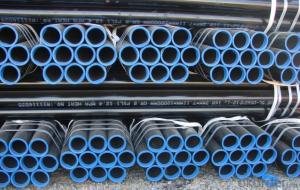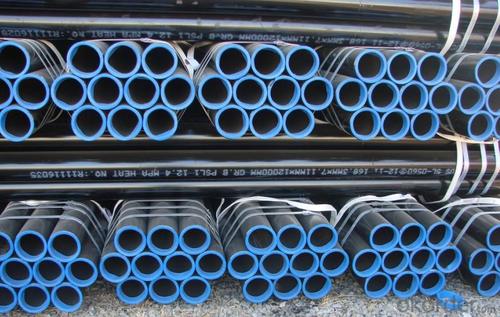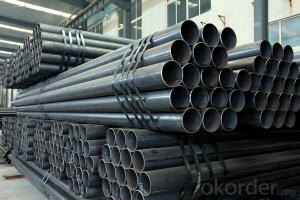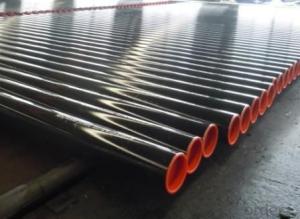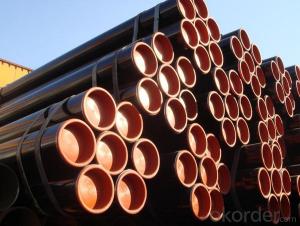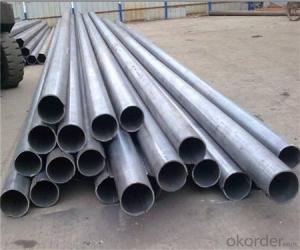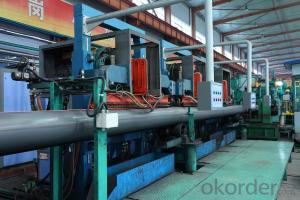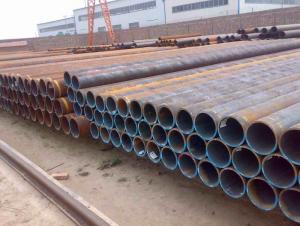ERW STEEL LINE PIPE
- Loading Port:
- China Main Port
- Payment Terms:
- TT OR LC
- Min Order Qty:
- -
- Supply Capability:
- -
OKorder Service Pledge
OKorder Financial Service
You Might Also Like
1)Outside Diameter: 10.3mm--914.4mm
2)Wall Thickness: 0.5~59.54mm
3)Length: Random 1~12m or fixed 6
4)Material quality: ASTM A106 / A53/A210, API 5L,API 5CT,DIN, EN, GB/T8162 / 8163, etc
5)Packing:Hexangular packing in bundles
6)Export: Europe, North America, the Middle East, Africa, Asia and other countries and regions, well received by consumers!
Product Name: | ERW pipe | |
Size | OD | 1/8” -24” (10.3mm-914.4mm) |
Wall Thickness | 0.5mm-59.54mm SCH30,SCH40,STD,XS,SCH80,SCH,XXS | |
Length | 1m-12m | |
Steel material | Q195,Q215,Q235,Q345,STL400,ST37-2,16Mn,X42,X52,X80,E235, Grade B, SS330,SPHC, S185,SS400,S235JR,ST52,STK500 | |
Standard | BS1387-1985,ASTM A53,ASTM A106,GB/T3091-93-2008,EN10129,JIS. | |
Usage | Used For irrigation,Structure, Accessorize And Construction | |
Ends | 1) Plain 2) Beveled 3) Threaded with Coupling & cap | |
Surface Treatment | 1) Bared 2) Black Painted (varnish coating) 3) Galvanized 4) With Oiled | |
Technique | Electronic Resistance Welded (ERW ) Electronic Fusion Welded (EFW) Double Submerged Arc Welded (DSAW) | |
Welded Line Type | Longitudinal | |
Inspection | With Hydraulic Test, Eddy Current , Infrared Test | |
Package | In Bundle with water-proof package | |
Delivery | 1) Container 2) Bulk carrier | |
Port of Shipment | Xingang Port,Tianjin, China | |
Date of Delivery | 15 days after contract | |
Payment | L/C at sight or 30% T/T | |
Others | Fitting as coupler and flange also can be supplied. | |
- Q: Can steel pipes be used in plumbing systems?
- Yes, steel pipes can be used in plumbing systems. Steel pipes are commonly used for plumbing installations due to their durability, strength, and resistance to corrosion. They are often preferred for larger water supply lines and can handle high pressure and temperature conditions. However, steel pipes require proper insulation to prevent heat loss and are typically more expensive than alternative materials like PVC or copper pipes.
- Q: Can steel pipes be used in earthquake-prone areas?
- Yes, steel pipes can be used in earthquake-prone areas. Steel is a strong and durable material that can withstand the forces generated during an earthquake. The flexibility and ductility of steel allow it to absorb and dissipate the energy of seismic waves, reducing the risk of structural failure. Additionally, the ability to weld steel pipes allows for the construction of robust and earthquake-resistant structures. However, it is important to ensure proper engineering and construction practices are followed to ensure the steel pipes are installed and connected correctly to maximize their earthquake resistance. Local building codes and regulations should also be considered to ensure compliance and safety in earthquake-prone areas.
- Q: Can steel pipes be used for transporting liquids?
- Yes, steel pipes can be used for transporting liquids. Steel pipes offer excellent strength, durability, and resistance to corrosion, making them suitable for various applications, including the transportation of liquids such as water, oil, and gas.
- Q: What is the role of steel pipes in the transportation of liquefied natural gas (LNG)?
- Due to their unique properties and characteristics, steel pipes are essential in the transportation of liquefied natural gas (LNG). LNG is a form of natural gas that is cooled to a liquid state for easier transportation and storage. Specific infrastructure is required for the transportation of LNG, and steel pipes are a crucial part of this infrastructure. To begin with, steel pipes are used in the construction of LNG terminals and liquefaction plants. These facilities are responsible for converting natural gas into its liquid form and storing it prior to transportation. The extremely cold temperatures needed to maintain LNG in its liquid state necessitate the use of materials that can withstand these conditions, and steel pipes are well-suited for this purpose. Steel pipes possess excellent strength and durability, enabling them to handle the low temperatures and high pressures involved in the liquefaction and storage processes. Additionally, steel pipes are employed in the transportation of LNG from the liquefaction plants to the storage tanks or shipping vessels. LNG is typically transported over long distances, either through pipelines or specialized LNG carriers. Steel pipes are utilized in the construction of underground or above-ground pipelines, providing a reliable and safe means of transporting the LNG. The pipes must be capable of maintaining the low temperatures of the LNG while enduring the pressures and stresses associated with the transportation process. Steel pipes offer the necessary strength, corrosion resistance, and thermal properties to ensure the safe and efficient transportation of LNG. Finally, steel pipes are also utilized in the construction of storage tanks for LNG. These tanks are designed to keep the LNG in its liquid state until it is ready for use or further transportation. The tanks are often constructed using a combination of steel plates and steel pipes. Steel pipes are employed to connect the various components of the tank, such as the inner and outer shells, reinforcing the structural integrity of the tank and guaranteeing its ability to withstand the extreme conditions to which it is exposed. In conclusion, steel pipes are vital in the transportation of liquefied natural gas (LNG) due to their strength, durability, and ability to endure low temperatures and high pressures. From the construction of LNG terminals and liquefaction plants to transportation through pipelines or specialized vessels, steel pipes are a crucial component of the infrastructure required for the safe and efficient transportation and storage of LNG.
- Q: Can steel pipes withstand high temperatures?
- Yes, steel pipes can withstand high temperatures as they have a high melting point and excellent heat resistance properties, making them suitable for various industrial applications involving high temperature environments.
- Q: Can steel pipes be used for hydraulic systems?
- Yes, steel pipes can be used for hydraulic systems. Steel pipes are commonly used in hydraulic systems due to their high strength, durability, and resistance to high pressure and temperature. They provide reliable performance and are suitable for a wide range of hydraulic applications.
- Q: Are steel pipes suitable for pharmaceutical manufacturing facilities?
- Indeed, steel pipes prove to be a fitting option for pharmaceutical manufacturing facilities. Their outstanding resistance to corrosion and durability make them a prevalent choice in this industry. They are capable of enduring high levels of pressure and temperature, rendering them perfect for a wide range of purposes, including fluid, gas, and chemical transportation within the facility. Moreover, steel pipes possess the advantage of effortless cleaning and sanitization, guaranteeing the preservation and safety of pharmaceutical products. Additionally, they offer cost-effectiveness and boast an extended lifespan, solidifying their status as a dependable choice for pharmaceutical manufacturing facilities.
- Q: How do you calculate the pipe buoyancy for steel pipes in water?
- The buoyancy of steel pipes in water can be calculated by determining the weight of the water displaced by the submerged portion of the pipe. This can be done by multiplying the volume of the submerged portion of the pipe by the density of water. The buoyant force acting on the pipe can then be calculated by multiplying the weight of the displaced water by the acceleration due to gravity.
- Q: What are low-pressure carbon steel tubes?
- Pipe fittingsA pipe fitting is a piece of pipe that is connected to a pipe. According to the connection method can be divided into socket type pipe fittings, threaded fittings, flange fittings and welding pipe four categories. Multipurpose; made of the same material as pipes. Elbow (elbow), flange, three pipe and four pipe (crosshead) and reducer (reducer) etc.. Elbow for pipeline corner; flange for the pipe and pipe interconnected parts, connected to the pipe end, three pipe for three pipe collection; four pipe for four tubes together place; for two pipes of different diameters connected to different diameter pipe.
- Q: How do you prevent leaks in steel pipes?
- One way to prevent leaks in steel pipes is by applying a protective coating or lining to the interior surface of the pipes. This can help to prevent corrosion and deterioration, which are common causes of leaks in steel pipes. Additionally, regular inspection and maintenance of the pipes, including checking for signs of damage or wear, can help to identify and address potential leaks before they become a problem.
Send your message to us
ERW STEEL LINE PIPE
- Loading Port:
- China Main Port
- Payment Terms:
- TT OR LC
- Min Order Qty:
- -
- Supply Capability:
- -
OKorder Service Pledge
OKorder Financial Service
Similar products
Hot products
Hot Searches
Related keywords
